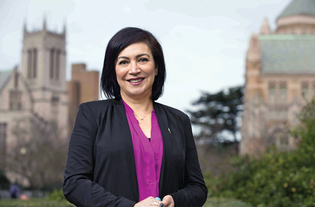
University of Washington School of Nursing
Azita Emami took office this summer as dean of the School of Nursing.
View full image
Perhaps it’s fitting that the 100th anniversary of the Yale School of Nursing this year coincides with the recent appointment of a woman lauded for her “history of visionary leadership.” Those words, from interim dean Holly Powell Kennedy, describe Azita Emami, who, as executive dean of the University of Washington Nursing School, has overseen a nursing institution consistently recognized as among the top in the country, according to U.S. News & World Report.
That’s in part due to Emami’s efforts to promote inclusion in the school’s culture and curriculum, as well as her focus on health equity. “In nursing, our responsibility is to care for people—all people, including those in marginalized communities,” says Emami, who earned her RN and PhD in medical sciences from the Karolinska Institutet in Stockholm. “A commitment to diversity, equity, and inclusion starts with a curriculum and programs that reflect those values.”
Emami worked in healthcare in Sweden before coming to the US to be the dean of the College of Nursing at Seattle University. She moved to her most recent post at the University of Washington in 2013. There, she redesigned the curriculum to emphasize population health and health equity; established the country’s first Center for Antiracism in Nursing; and developed a pipeline of primary care providers in critically underserved rural areas of the state.
“Nurses—not only in the US, but also globally—play a crucial role in addressing some of the most challenging and persistent health issues especially in relation to marginalized communities without access to health care,” she says. “The pandemic showed that these disparities are actually deadly not only because people lack access but because many come with a lot of co-morbidities precisely because of that lack of access.”
Another casualty of the pandemic: nurses. “They did a heroic job, they saved a lot of lives, but they are burned out,” she says. That’s resulted in a vicious cycle. “As nurses move out of our profession, the pressure is on nurses that remain.” The solution, she said, “requires a robust partnership with other organizations to support and retain nurses.”
Whether within the school or in the community, “I believe in collaborative and inclusive work,” she says. “It’s crucial that I am listening more than talking, because it’s the people in those spaces that usually know better what is needed. True community-based work is only successfully accomplished through equitable partnership and co-creation.”
 loading
loading